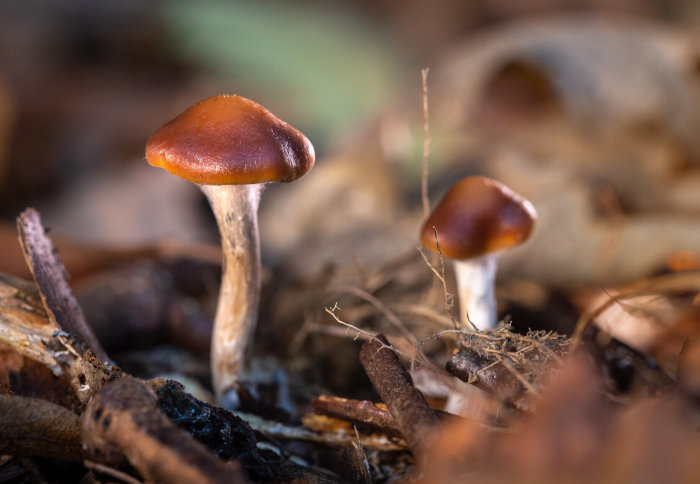New wave of psychedelic research yielding "exciting results” for mental health

Psychedelic "magic mushrooms" (Psilocybe cyanescens) growing wild in a park in West London
New research into applications of psychedelics represents one of the most important initiatives in psychiatry and brain science in recent decades.
This is the central message of a new commentary published this week in Cell by researchers at Imperial’s Centre for Psychedelic Research.
In the paper, Professor David Nutt and colleagues Dr Robin Carhart-Harris and Dr David Erritzoe explore the context and potential of the recent “psychedelic revolution in psychiatry.”
Overcoming challenges to research
In the 1950s and 1960s, psychedelic drugs like LSD and psilocybin showed promise for treating conditions including alcoholism and some psychiatric disorders. The commentary describes how political and legal challenges have impacted the progression of psychedelic research over the years, noting: “Before LSD was banned, the US NIH funded over 130 studies exploring its clinical utility […] Since the ban, it has funded none.”
However, Professor Nutt and his colleagues explain that following “several years of battling with regulators and ethics committees”, clinical research into the applications of psilocybin and other psychedelic compounds has gradually been re-established. In April 2019, Imperial officially launched the world’s first formal centre for psychedelic research.

Promising results
The authors examine key research questions, including what is known about the receptors in the brain affected by psychedelic drugs and how stimulating them might alter mental health. They also address what has been learned so far about so-called microdosing, the value of the psychedelic “trip,” and what researchers know about why the effects of these trips are so long-lasting.
Brain imaging has shown that the activity of psychedelic drugs is mediated through a kind of serotonin receptor in brain cells called 5-HT2A. These receptors play an important role in cognitive function and high numbers of them are found in the so-called ‘thinking’ parts of the brain.
The key part of the brain that appears to be disrupted by the use of psychedelics is the default mode network. This area is active during thought processes like daydreaming, recalling memories, and thinking about the future. It is also an area that is overactive in people with disorders like depression and anxiety. Psychedelics appear to have long-term effects on the brain by activating 5-HT2A receptors in this part of the brain.
What’s next for psychedelic research?
More research is needed to understand why the effects of psychedelics are so long-lasting, both from a psychological perspective and in terms of altered brain functioning and anatomy.
For this research to take place, the authors underline the importance of “rescheduling psychedelics with proven therapeutic utility, especially psilocybin.” They comment that in the past ten years psychedelic research has “delivered remarkable insights”, but that it is now essential to commit to a “combined, multi-level, multidisciplinary program of research into the mechanisms underpinning these findings.”
This article was adapted from a press release by Cell.
‘Psychedelic Psychiatry’s Brave New World’ by David Nutt et al., is published in Cell.
Article text (excluding photos or graphics) © Imperial College London.
Photos and graphics subject to third party copyright used with permission or © Imperial College London.
Reporter
Ms Genevieve Timmins
Academic Services